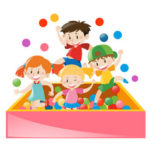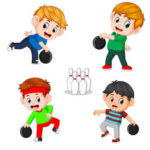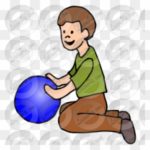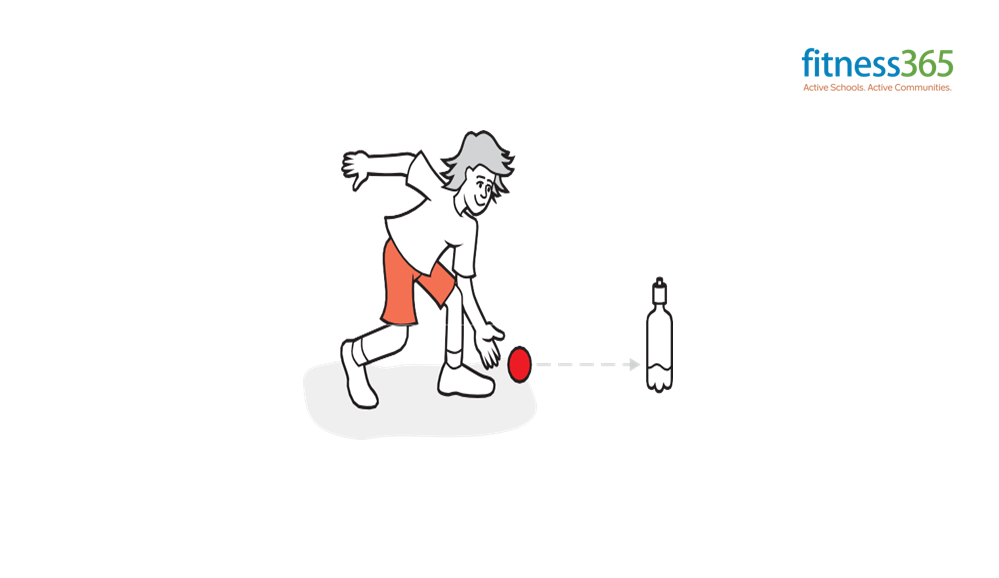
by Neetu | Jun 4, 2020 | Fitness Activity
Movement skills/concepts
Rolling a ball along the ground, at a target, in different pathways and directions, and relationships (with others).
Set-up
- Small and large balls, cones, hoops, skittles, ropes and chairs.
- Children work in pairs, threes and fives, with one ball per pair or group, in a smooth, hard area.
Activity
- roll the ball to your partner through a target or obstacle, (e.g. between two cones, through a hoop, at a skittle, at another ball, along a line, under a chain, between ropes)
- take turns at rolling the ball to a wall target
- roll the ball to your partner, varying the distance between 3 and 10 metres
- roll it to your partner, then change places
- roll it as many times as you can in 30 seconds
In threes Can you …?
- roll the ball for the middle child to jump over
- play ‘piggy in the middle’, in which the middle player attempts to intercept the rolled ball
In fives
- roll the ball around/across a circle towards your partner or other players
- roll it to hit a skittle in the centre of a circle
- have one player in the centre who rolls the ball to others in turn
- holding a small ball in the fingers, held beneath a large ball with fingers spread
- stepping with an opposite foot into a roll
- long arm action, following through

by Neetu | Jun 4, 2020 | Fitness Activity
Movement skills/concepts
Exploring passing, throwing, catching and rolling, time and energy, and body awareness.
Set-up
- A wide variety of balls to throw and pass (small balls, large round balls, oval balls, foam balls, sea urchin balls).
- The children and balls are spread out in a defined hard or grass area.
Activity
Children select one or more balls. They begin to practice the following tasks with the ball, before changing to a different type of ball for the later tasks.
- in the air with one hand, two hands, the other hand, from hand to hand
- forwards, backward, to the side, at an angle
- as far/near as you can, moving your throwing arm(s) as fast as you can, twisting your body as fast as you can
- up high, down low, bouncing off the ground, at a target
- sitting down, kneeling, lying down
- along the ground, on a line, along the ground to a target/line, to stop between two lines or in the hoop
- overarm/underarm with one hand
- with two hands at chest level, making the ball bounce to the ground and catching it
- along the ground to a partner, bouncing high/low to a partner
- to a partner who is a long way away, to a partner who is very close
- using/without using your legs/trunk
- smoothly, using as little movement as possible
- using as much movement as possible or as jerkily as you can
- using a bounce-catch action, on the spot, while moving, turning around
- children enjoying themselves
- trying out different types of balls
- keeping eyes on the ball
Variations
Vary equipment: Complete the tasks with other objects like beanbags, frisbees, quoits, plastic containers, juggling balls, and scarves.
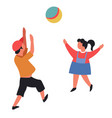
by Neetu | Jun 4, 2020 | Fitness Activity
Movement skills/concepts
Catching a variety of objects, catching while moving in different pathways and at different levels and speeds
.
Set-up
A variety of balls (small, large, soft, hard, spiky) and objects (beanbags, quoits). Children, with a ball/object each, are spread out in a defined hard flat area.
Activity
- describe how the ball/object feels – think of the texture/hardness
- roll the ball/object over your body – up and down, round and round, down a leg or arm
- roll it along the ground slowly, run round in front of it and pick it up
- holding the ball/object in a two-hand ‘nest’, drop it and catch it while standing/ kneeling/walking along
- drop the ball/object from one hand and catch it in the two-hand ‘nest’
- throw the ball/object up, a little higher each time, and catch it – how high can you go?
- throw the ball/object up with one hand and catch it in the two-hand ‘nest’
- bounce or throw the ball/object and clap your hands then catch it
- see which ways you can catch as you move around (e.g. one hand and then the other)
- relaxed fingers forming a ‘nest’ about the size of the ball/object
- eyes on the ball/object
- reaching for the ball/object
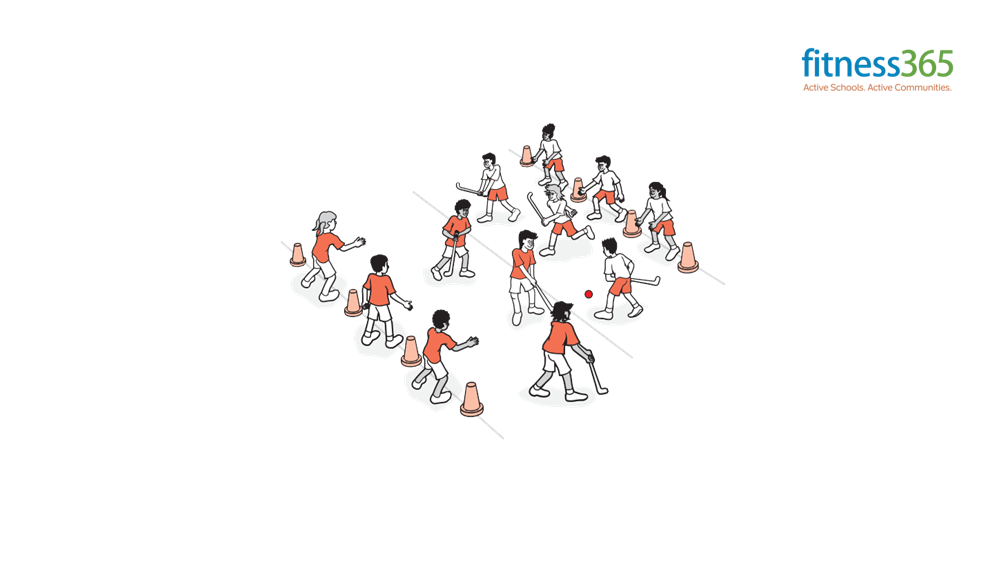
by Neetu | Jun 3, 2020 | Fitness Activity
Movement skills/concepts
Passing with a long implement (hockey stick), dribbling, trapping, striking for accuracy, space awareness, and relationships (with others).
Set-up
- Markers, hockey sticks, and small balls.
- Two teams of six: three are ‘goalies’ and three are ‘rovers’.
- In a level grass or hard area, markers divide a goal line at each end into three goals.
Activity
One team starts with the ball at the centre and the rovers try to score a goal in any of the opponent’s three goals. On the opposing team, the rovers try to intercept while the goalies aim to stop goal attempts. After a goal is scored, the non-scoring team takes the ball from its goal line. When a ball is intercepted, the other end is attached. Change goalies and rovers after about 3 minutes.
A goal can only be scored along the ground.
- quick passing
- use of space
- teamwork
Variations
Vary skill: Use large balls and striking with the feet (e.g. soccer). Increase/decrease goals and/or field size.
Vary rules: Adjust area to suit skill, have only four goals (one in each corner), have four rovers, and introduce a second ball.
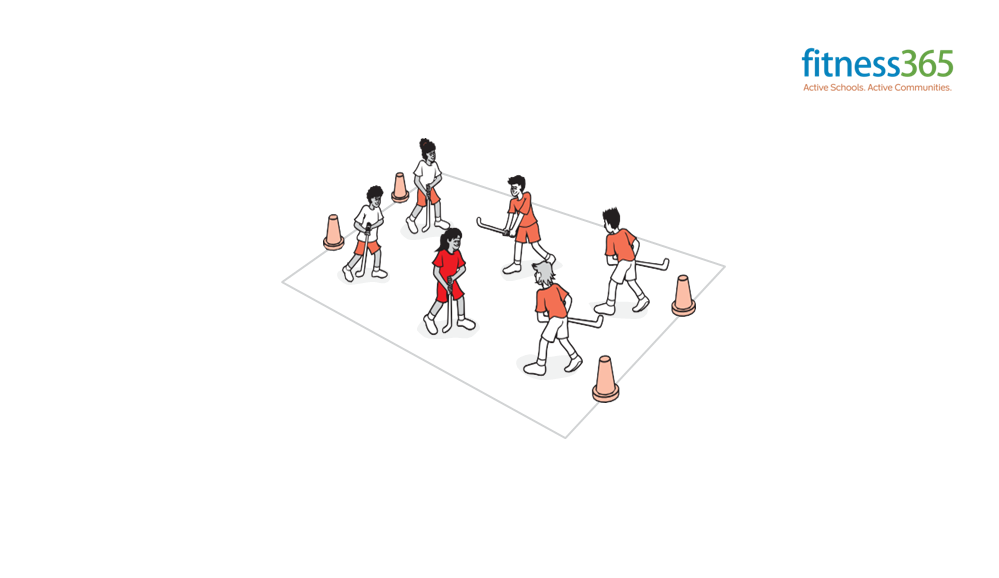
by Neetu | Jun 3, 2020 | Fitness Activity
Movement skills/concepts
Passing and striking with a long implement (hockey stick), striking for accuracy, trapping and tackling, space awareness and relationships (with others).
Set-up
- Hockey sticks and small balls.
- A defined level grass or hard area with a goal at each end.
- Three teams of two: one team defending each goal, and an attacking team.
Activity
The attackers start from the centre and attack one goal. If they score or the ball crosses the goal line or the defenders gain possession, the defenders take the ball to the centre and attack the other goal. The previous attackers take over the defence of the vacated goal.
- use of space
- quick passing and moving
Variations
Vary rules: Do not take the ball back to the centre to restart. The new attackers start from the goal line.
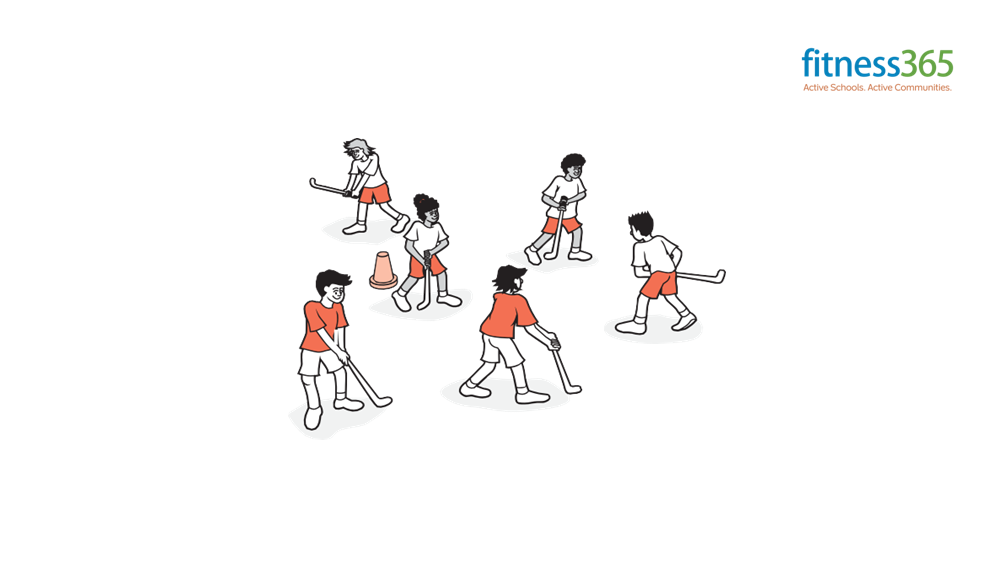
by Neetu | Jun 3, 2020 | Fitness Activity
Movement skills/concepts
Passing and striking with a long implement (hockey stick), intercepting or tackling space awareness, and relationships (with others).
Set-up
- Hockey sticks, balls, markers, team bands/bibs.
- Two even teams of approximately three children each.
- Markers are set up as a goal in the middle of a level grass or hard area.
Activity
Each team is given one side of the goal to score from. One team starts with the ball on its side at a distance from the goal and attempts to score. If the other team intercepts/tackles successfully, its players work together and move the ball around to their side to try to score. After a goal is scored, the non-scoring team restarts from its side.
- safety
- eyes up, looking around
- quick passing
- the ball kept on the ground
Variations
Vary rules: Play a continuous game, where there is no stopping after a goal.








